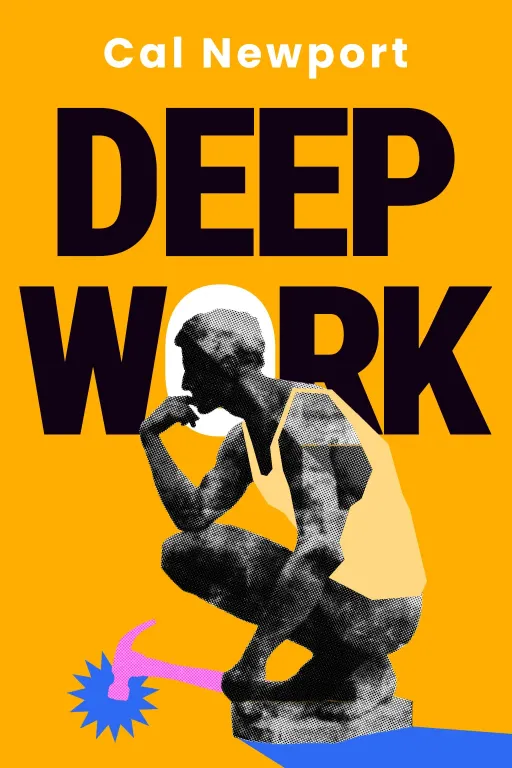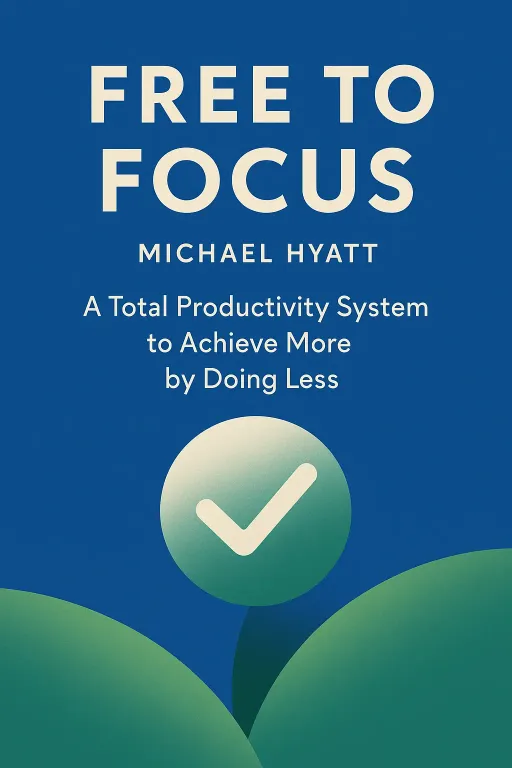
The Focus Algorithm: A Tech Mastermind's Guide to Deep Work
10 minGolden Hook & Introduction
SECTION
Nova: Imagine you're a brilliant developer, hired to solve complex problems. Yet, you spend sixty percent of your day in meetings, answering emails, and reacting to Slack pings. You're busy, but are you? This is the paradox Cal Newport tackles in his game-changing book, "Deep Work." He argues that in our hyper-connected world, the ability to focus without distraction is becoming as rare and valuable as a superpower. And for analytical minds in a field like technology, mastering this skill isn't just an advantage—it's everything. Welcome to the show, Portia. As someone deep in the tech world, does that paradox resonate with you?
Portia: Resonate? Nova, it’s the daily reality. It’s what we talk about over coffee, or more accurately, in hurried Slack messages between meetings. Newport has given a name to this struggle: attention fragmentation. We're hired for our minds, but the modern workplace seems engineered to shatter our ability to use them.
Nova: Exactly. And that's why we're so excited to have you here. Today we'll dive deep into this from two perspectives. First, we'll explore the powerful, almost economic, argument for why deep work is the single most valuable skill in the 21st century. Then, we'll get tactical and discuss how to build your own personal 'focus algorithm' by choosing a philosophy and creating rituals that make deep work automatic.
Deep Dive into Core Topic 1: The Value Proposition
SECTION
Nova: So let's start with that core idea, Portia. Newport isn't just saying 'focus is good.' He's making a bold economic claim. He calls it The Deep Work Hypothesis: the ability to perform deep work is becoming increasingly rare at exactly the same time it is becoming increasingly valuable.
Portia: Which creates a massive opportunity for anyone who can cultivate it. It's a classic supply and demand problem, but for a cognitive skill.
Nova: Precisely. To really get it, we have to understand his two definitions. First, there's "Deep Work": professional activities performed in a state of distraction-free concentration that push your cognitive capabilities to their limit. This is what creates new value and is hard to replicate.
Portia: That’s the work you're actually hired to do. Writing elegant code, designing a system architecture, devising a long-term strategy.
Nova: And then there's its enemy: "Shallow Work." These are the non-cognitively demanding, logistical-style tasks, often performed while distracted. Think answering most emails, scheduling meetings, posting a status update. Newport cites a 2012 McKinsey study that found the average knowledge worker spends over sixty percent of their week on this stuff—electronic communication and internet searching.
Portia: Sixty percent. That's three out of five days spent on work that, according to Newport's definition, doesn't create much new value and is easy to replicate. That's a terrifying statistic for any company that thinks it's innovating.
Nova: It is. And to show the alternative, Newport tells this incredible story about the psychiatrist Carl Jung. In 1922, after his break with Freud, Jung needed a space to think. So he went to the woods by a lake in Bollingen, Switzerland, and built a simple, two-story stone house he called "the Tower." There was no electricity, no running water. Every morning, he would rise early, lock himself in his private office, and just write. He said, "In my retiring room I am by myself. I keep the key with me all the time; no one else is allowed in there." It was in this forced isolation that he developed some of his most influential theories.
Portia: He created a physical fortress for his mind. What's striking is how modern companies do the exact opposite. We have these massive, open-plan offices, like the one Facebook famously designed—a ten-acre open room. The stated goal is to foster "serendipitous collaboration."
Nova: Right, the idea that people will just bump into each other and create magic.
Portia: But that's a perfect example of what Newport calls the 'any-benefit' mindset. Yes, there's a benefit to serendipity, but it completely ignores the massive, guaranteed cost to individual focus. The output of a programmer, or any creative professional, isn't linear. The author Neal Stephenson has a great quote about this. He says if he gets long, uninterrupted chunks of time, he can write a novel. But if that time is fragmented, what replaces the novel is just a bunch of emails.
Nova: And Newport gives us the perfect scientific term for that mental hangover from switching tasks: 'attention residue.' When you switch from, say, a complex coding problem to a quick Slack message, your brain doesn't fully transition. A residue of your attention remains stuck on the previous task, and your performance on the new one—and the one you return to—is diminished.
Portia: Exactly. And in coding, that residue is fatal. A single misplaced semicolon can break an entire application. You can't afford to have your mind half-on a Slack conversation while you're in the middle of a complex function. The cost of context-switching is astronomically high. Jung understood that. He didn't just go to the woods; he locked the door. He eliminated the very possibility of context-switching.
Deep Dive into Core Topic 2: Building Your Focus Algorithm
SECTION
Nova: So if we agree that our environment is actively hostile to deep work, and our willpower alone isn't enough to fight it, Newport says we need a system. He calls it choosing a 'depth philosophy.' This isn't about trying harder; it's about designing smarter. The core idea is that our willpower is a finite resource, like a muscle that gets tired. Routines and rituals are what conserve that energy for the actual work.
Portia: I love that. It's moving from brute force to smart architecture. It’s about designing a personal 'operating system' for productivity. As an INTJ, that's music to my ears. It’s not about emotion or motivation; it's about building a better system.
Nova: It is! And he offers a few models. Let’s look at two that are polar opposites. On one extreme, you have the 'Monastic' philosophy. This is where you radically minimize or eliminate shallow obligations. The prime example is Donald Knuth, a legendary computer scientist at Stanford. He is one of an elite few who can say his work is to simply computer science. To do this, he quit email. Entirely.
Portia: He quit email? In 1990, no less! That's almost prophetic.
Nova: Yes! On his website, he explains that he's been a "happy man" ever since. He has a postal address. His administrative assistant goes through the mail, filters it, and brings him a batch of anything truly urgent. The rest he deals with every three months or so. He's basically unreachable.
Portia: He's defined his own API for communication. The protocol is: 'Send me a physical letter, and expect a response time measured in seasons.' It's extreme, but it's a crystal-clear system. It sets the expectation that his time is dedicated to one thing: deep thought.
Nova: But of course, most of us can't do that. So on the other end, Newport presents the 'Bimodal' philosophy. This is where you divide your time into distinct chunks. Some stretches are for deep work, where you act monastically, and the rest of your time is open to everything else. He points to Adam Grant, the superstar professor at Wharton.
Portia: Ah, I've read his work. He's incredibly prolific.
Nova: And here's how. Grant 'stacks' all of his teaching and student meetings into the fall semester. That semester, he's open, collaborative, and accessible. But the spring and summer? That's his deep work time. He essentially disappears into research. He'll shut his office door, put on an out-of-office auto-responder, and become a hermit for days at a time to work on a paper. He alternates between being fully connected and completely monastic.
Portia: So his communication API is different. It's 'I'm in deep work mode this semester, but I'll be fully available and responsive next semester.' It's still a clear protocol, just with a different cadence. It acknowledges that for most of us, our value comes from both deep work collaboration. The key is to not mix them. You do one, then the other.
Nova: And for those moments when you need an even bigger push, he talks about making a 'grand gesture.' The best story is about J. K. Rowling. While finishing the final Harry Potter book,, she was struggling to focus at home. The dog was barking, the kids were around, window cleaners were outside. She just couldn't get into the zone.
Portia: The classic work-from-home nightmare.
Nova: So, on an impulse, she checked into a grand, five-star hotel in Edinburgh, the Balmoral. And suddenly, the words started flowing. She said the quiet and focus were amazing. She ended up going back every single day until she finished the entire book there.
Portia: That's not just about escaping distractions. It's a psychological commitment device. The financial investment of a suite in a five-star hotel, the ritual of going there each day—it signals to your brain: 'This is important. This is what we are doing now. All other inputs are now noise.' It's a system reboot. In tech, we do this with off-site hackathons. You take the team, put them in a new environment for 48 hours with a clear goal, and the change of scenery and intense focus produces incredible results. Rowling just did a solo hackathon for her novel.
Synthesis & Takeaways
SECTION
Nova: I love that framing. A solo hackathon. So, as we wrap up, it feels like the two big ideas are clear. First, we have to recognize that deep work isn't just a nice-to-have; it's this incredibly valuable, rare skill, especially in fields like tech.
Portia: Exactly. It's about being intentional. Moving from a reactive state, where your day is dictated by your inbox and notifications, to a proactive, architectural one where you design your day and your habits around what truly creates value.
Nova: And second, that the key to unlocking it isn't just trying harder, but building a system—a personal algorithm—to protect our focus.
Portia: A system with clear rules, whether that's a monastic rejection of email or a bimodal schedule or even a grand gesture to break out of a rut.
Nova: So for everyone listening, especially those analytical minds like Portia, here's a challenge from the book. Don't just about this. it. For one week, keep a simple scoreboard. A piece of paper next to your monitor will do. Every day, just track the number of hours you spend in a state of true, uninterrupted deep work. The results might surprise you.
Portia: It's the classic engineering principle: you can't optimize what you don't measure. It forces you to confront the gap between how you you spend your time and how you spend it. It’s the perfect, data-driven first step to building your own focus algorithm.
Nova: A brilliant way to put it. Portia, thank you so much for helping us decode this.
Portia: My pleasure, Nova. It was a deep dive.









